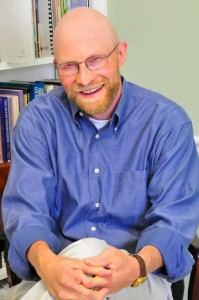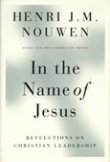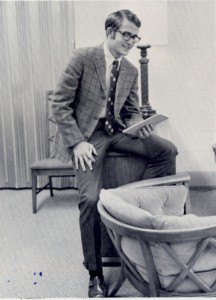Since the commissioner committee on which I was serving met on Monday, I had a light schedule in the morning and got to spend some time with my middle son Justin Locklear who lives in Dallas. He drove down to Houston to catch up a bit and just “take a break” from his harried life as an actor, designer, playwright, barista, singer-songwriter and boyfriend. Included in our time was a visit to one of his college roommates who is now a barista at what is arguably Houston’s best coffee shop Catalina Coffee. OK, back to the General Assembly….
I had targeted a couple of seminars to attend on Tuesday afternoon, but one was cancelled due to illness of David Powlinson, Exec. Director of CCEF. He was scheduled to lead a session on “Being Heard: What are People Thinking When You Talk to Them?” So, I spent some time talking to John Purcell who has been a consultant to Intown over the past few years and a friend for more than 20 years. That led to my attending the seminar that he and Gordon Moore, Director of Operations and Support Ministries at Perimeter Church, were doing on “When Your Pastor Moves On – Best Practices in Pastoral Succession.”
In the seminar, Gordon shared what he had learned during a “pastor succession” tour he had done a couple of years ago when he visited 20 churches of various denominations that were at some point in a senior pastor transition. He said that he was given access to some of their board/session meetings, staff meetings and pastor search committee meetings along with interviewing key leaders to discover what had worked and what had not worked in the process. You can email John and Gordon at john@transform-coach.com and gordonm@perimeter.org for a copy of their PowerPoint, but Gordon’s first, and most important, takeaway was: The current Senior Pastor is the most important person in the process and is more important than the timing or strategy. The topic that received the most questions during the Q&A time was the need to have an Emergency Transition Plan should the senior pastor become suddenly ill or incapacitated. The plan should include operational assignments and a preaching plan.
John Purcell talked about what the leadership board or elder session needs to be doing during any transition. He stressed that a congregation needs to do intensive work on defining the church’s mission, vision, values and priorities. John said that after that work is done the church could develop a profile of the pastor they need to lead them in implementing their strategic plan. All of this requires lots of work, but is worth the effort. This is exactly what my home church Intown Community has been doing the past year and we believe we are much better prepared in our current search efforts. Of course, John said that there needs to be some room for tweaking the plan based upon who actually accepts the call from the church, but for the most part the congregation needs to be true to it’s real and aspirational identity.
After dinner, our friend and fellow ruling elder Bruce Terrell called the 42nd General Assembly to order. Bruce has been the Moderator for the past year and most of his work was done as of last night. Of course, those of us at Intown are exceptionally proud of his leadership and service. Bruce is a Ruling Elder at Redeemer Presbyterian Church in New York City where he also serves at the church’s executive director.
The first order of business was a time of worship. The liturgy was fairly traditional and the music included a balance of traditional, including the African-American Spiritual “Jesus Walked This Lonesome Valley,” and two contemporary tunes: “Redeemed, Restored, Forgiven” featuring new music by Matthew Smith and Jeff Pardo to lyrics written in 1876 by Henry Baker; and “His Love Can Never Fail” music by Christopher Miner of Indelible Grace in 2004 and lyrics by E.S. Hall in 1897. I guess we like our lyrics from the 19th century and our music from the 21st.
All of this was a prelude to what was the highlight of the evening and possibly the week, the sermon by Ray Cortese, pastor of Seven Rivers Presbyterian Church in Leconta, FL.
The title for his sermon was “A Beautiful Orthodoxy” and it included stories from the life of incarnate Jesus and illustrations of when orthodoxy looks beautiful. In many ways this was homage to grace personified. He told stories of how people who had been hopeless were “floored by Jesus” that they saw in churches, individuals and families. It will be difficult for me to capture the sense of his teaching in a report. I’ll try to hit a few points of his outline, but I strongly encourage you to listen to the sermon online. I’ll get the link and post on my twitter and Facebook pages.
The scripture passage that Ray spoke from was Matthew 12:1-14 and after reading it, he said that the Pharisees were so orthodox that they missed Jesus because he wasn’t as orthodox as them. He then went into illustrating from Jesus and from those who follow Jesus the “Marks of Beautiful Orthodoxy.”
He had three marks that he highlighted: Humility, Mercy and Rest. He spent the most time on humility and at one point recited the song “It’s me, it’s me, it’s me, O Lord, standing in the need of prayer.” He said that too often we cover ourselves by comparing ourselves with others. He also shared the story of Rosario Butterfield, the former Syracuse University professor who was converted through a series of dinners with the family of a pastor who regularly confessed his sin at the evening prayer before dinner. Concerning mercy, Ray referred to Jesus words describing a sheep falling into a pit that we should pick it up. Regardless of the day or time, mercy is always acceptable. Especially with people.
In a lighter note, Rev. Cortese quoted from C.S. Lewis and Frances Schaeffer during his sermon and said that if he also quoted from “Keller” that he would have the sermon “hat trick!” The final mark of beauty that Ray drew out of the Scripture was “Rest.” He reminded us of all those days in Egypt when God’s people were forbidden from resting. And how Jesus was the one who had made the Sabbath and how unique this concept was across our nation and world. And he gently challenged us to make rest a part of our relationship with God and our weekly lives. And not to get caught up in the “ceaseless work of our self validation. Pastoring is hard,” he said. And reminded us of his own story of grace from Romans 1. “There is a righteousness that comes from God,” and that makes all the difference. He concluded this mark with this reminder, “the Savior calls us to rest.”
Again, I’ll post the link of this passionate and clearly articulated sermon. Subsequently, we celebrate the Lord’s Supper and concluded the service. Then, Moderator Terrell oversaw the election of his replacement – Dr. Bryan Chappell (more on Dr. Chappell tomorrow) and then received a special recognition from the Assembly. It was reported that we had 1,050 registered commissioners and over 800 of them are teaching elders.
Another personal note, I greeted former RUF minister at Emory and Intown Jeremy Jones who is a pastor in Memphis and his oldest son who is now 17 and, who I interviewed for confirmation, is now taller that Jeremy. Like many, Jeremy and his family cherish the relationships they had at Intown Community Church and School.




